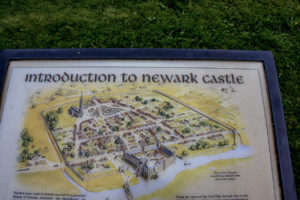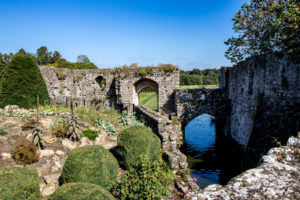Newark Castle, in Newark-on-Trent, in the English county of Nottinghamshire was founded in the mid 12th century by Alexander, Bishop of Lincoln. Originally a timber castle, it was rebuilt in stone towards the end of the century. Dismantled in the 17th century after the English Civil War.
In a charter generally thought to date to 1135, King Henry I granted the Bishop of Lincoln permission to build a castle. Alexander also established a mint at the castle. This early castle was most likely of timber construction and was rebuilt in stone towards the end of the century. King John died after a feast at this castle on the night of 18 October 1216 from dysentery, according to tradition from eating a “surfeit of peaches”
The castle was slighted in 1648 and left derelict. Between 1845 and 1848 architect Anthony Salvin restored the castle, and in 1889 the corporation of Newark purchased the building and carried out further restoration work.











